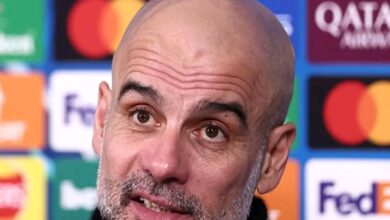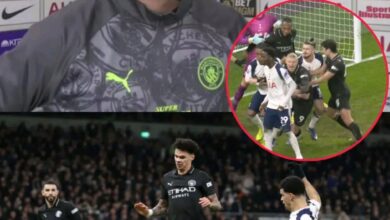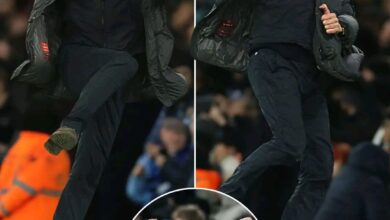Man City fans lost it with Anthony Taylor and VAR over huge controversy in their win over Bournemouth and now, former PGMOL chief Keith Hackett has delivered his final verdict after re-analysing the footage.

The atmosphere at the Etihad Stadium on that cool November evening was electric. Manchester City were back in Premier League action, facing Bournemouth in a match that many thought would be a straightforward victory for Pep Guardiola’s side. But as is often the case in football, what looked like a simple game on paper turned into a storm of controversy, emotion, and debate that stretched long after the final whistle. The talking point that dominated the headlines was not Erling Haaland’s goals or City’s impressive display, but instead, a single moment involving Bernardo Silva, a deflection, and a non-awarded penalty that left City fans furious and former referees shaking their heads in explanation.
Manchester City ended up winning the match 3-1, climbing to second in the Premier League table and keeping pressure on their rivals in the title race. Yet despite the comfortable scoreline, the game was filled with drama, frustration, and questions about the decisions made on the pitch. Bournemouth, fighting hard to survive in the top flight, gave Guardiola’s men a real test. Tyler Adams’ controversial equaliser had already raised eyebrows before another contentious moment arrived midway through the first half.
It happened in the 28th minute. Bernardo Silva, who had been one of City’s most creative outlets, drove forward and attempted a dangerous cross into the Bournemouth box. The ball deflected off a defender’s leg and appeared to strike Alex Jimenez’s arm. Immediately, City players surrounded referee Anthony Taylor, waving their hands and demanding a penalty. The home fans inside the Etihad erupted in anger, shouting and pointing at the big screens, convinced that justice had once again gone against their side. But Taylor, calm and unmoved, simply pointed for a corner kick. There was no pause, no sign of a VAR check being publicly displayed, and no visit to the monitor. To the crowd, it looked like the referee had ignored the incident entirely.
Pep Guardiola was furious on the touchline. He gestured wildly, shouting toward the fourth official, demanding an explanation. Bernardo Silva himself stood in disbelief, his arms raised as he pleaded his case. The cameras caught the moment Pep muttered something under his breath, his expression full of frustration. For a manager obsessed with perfection, decisions like this sting deeply—especially when his side dominates possession and still finds themselves battling against more than just the opposition.
By the time the final whistle blew, Manchester City had done their job. Erling Haaland had scored twice, continuing his phenomenal run of form with his 12th and 13th goals of the Premier League campaign. Youngster Nico O’Reilly added a late third to secure the points. But the celebrations were mixed with anger and disbelief. The penalty that wasn’t given became the main subject of discussion on social media, in the stands, and among pundits. Fans accused the officials of inconsistency. Some claimed VAR had failed City once again.
It didn’t take long for the debate to spread beyond the stadium. On Monday morning, football shows and online debates were filled with replays of the incident. Fans froze frames and drew lines on screenshots, arguing that Jimenez’s arm was in an unnatural position. Others countered that the deflection off his leg made it accidental. The football world was divided.
Then came the voice of authority. Former Premier League referee and ex-PGMOL chief Keith Hackett gave his professional verdict in an exclusive interview with Football Insider. And according to him, the officials had made the right call.
Hackett explained that the rules of modern football are clear: when the ball deflects off a player’s leg or another part of the body before hitting their arm, and the contact is not deliberate, it should not be penalised. “That’s the problem,” Hackett said. “The player has no chance of moving his arm out of the way, so that’s not a penalty kick. The complication of handball is that when it’s deflected off the knee, it’s not deliberate handball, and therefore, not penalised. The match officials got that one right.”
His words were meant to calm the storm, but in truth, they only added to it. City fans didn’t agree. They argued that whether or not it came off the defender’s leg, Jimenez’s arm was in an unnatural position that blocked the ball from reaching the box. For them, intent didn’t matter—only outcome did. If a ball strikes an arm inside the box and stops a promising attack, then it should be punished.
Hackett, however, stood firm. He suggested that referee Anthony Taylor likely received silent guidance from the VAR room, even if there was no visible interruption. “He’s probably got his mate, without visible VAR interruption, verbally communicating that it isn’t a penalty,” he explained. “He’s likely getting that guidance.” In other words, VAR had quietly reviewed the moment in the background and agreed that it wasn’t worthy of a formal review or on-field check.
That quiet communication, though within the rules, frustrated fans even more. Many supporters have grown tired of the lack of transparency around VAR decisions. They believe that supporters inside the stadium should be kept in the loop, rather than left guessing what is being reviewed or discussed. To the average fan, silence often feels like ignorance.
Pep Guardiola himself did not hold back after the game. In his post-match interviews, he chose his words carefully but made his feelings known. “Sometimes I don’t understand,” he said. “The rules, they change every week. Maybe it’s handball, maybe not. But we cannot control it. We play our football and we win.” It was vintage Guardiola—measured, slightly sarcastic, and clearly annoyed.
This was not the first time City had felt wronged by officiating this season. Over the last few months, there had been growing tension between the club and referees over marginal offside calls, soft penalties, and what many supporters felt were inconsistent standards compared to other top clubs. The sense of injustice has been building, and the Bernardo Silva handball controversy only poured fuel on that fire.
The irony of it all was that despite the drama, City were still the better team by a mile. Haaland’s clinical finishing, Silva’s creativity, and O’Reilly’s youthful energy made the difference. But in football, emotion often outweighs reason. Fans remember moments of anger longer than they remember goals. And in the days following the game, City’s 3-1 win was almost forgotten as every discussion returned to that single moment in the 28th minute.
For Bournemouth manager Andoni Iraola, the match was a nightmare of tactical errors. He was criticised by pundits for leaving too much space between the midfield and defence, allowing City to control the game easily. His decision to play with such a high line against Guardiola’s side was labelled “naive” by analysts. Even so, he could have counted himself lucky that the penalty wasn’t given. Had the referee pointed to the spot, the game could have been over by half-time.
VAR’s role in the Premier League continues to spark endless debates. Introduced to eliminate clear and obvious errors, it has instead become a source of confusion and division. Referees are often caught in difficult situations where every decision is dissected from multiple camera angles and slowed down frame by frame. What looks accidental in real time can appear deliberate in slow motion, and vice versa. Keith Hackett’s explanation was a reminder that the human element still defines the game, even with all the technology involved.
Inside City’s dressing room after the match, the mood was mixed. Players congratulated each other for the win, but several of them were still talking about the decision. Bernardo Silva, ever calm and thoughtful, was heard saying to teammates, “It hit the arm, no? Everyone saw it.” Haaland, always passionate, laughed it off, saying, “Next time we just score four, then no problem.” Pep, meanwhile, remained silent for most of the team talk, before finally saying, “We control what we can control. We win, and that is the answer.”
By the next morning, sports newspapers were filled with pictures of Pep shouting from the sidelines and screenshots of the incident. Fans online used the hashtag #JusticeForBernardo to express their anger. The Premier League’s refereeing body released no official comment, choosing instead to let Hackett’s words and the result speak for themselves.
But deep down, this episode highlighted a bigger issue in modern football—the growing gap between fans’ emotions and the officials’ explanations. Rules about handball have become so complex that even players and managers struggle to interpret them. In the space of just a few years, football went from a simple “ball hits hand” understanding to a rulebook full of conditions, exceptions, and interpretations. And when emotions run high, logic often loses the battle.
As the dust settled, one thing became clear: Manchester City had done enough to win the match, but the feeling of injustice would linger. Guardiola’s men would move on to their next challenge, but that moment with Bernardo Silva would remain in fans’ minds as another example of why VAR continues to divide opinion.
For Keith Hackett, it was business as usual—another day, another explanation. For the referees on duty, it was a case of following the rules. But for the thousands of City fans who paid to watch that game, it was another reminder that football is not just about goals and tactics—it’s about passion, fairness, and the thin line between triumph and frustration.
In the end, the scoreboard read 3-1 to Manchester City. But beyond the numbers, the real story was about perception. It was about how one decision could overshadow an entire performance. Pep Guardiola, in his own reflective way, would later say to his staff, “We play again in three days. That is what matters.” And he was right. City’s pursuit of perfection doesn’t pause for controversy. Yet for fans, that burning sense of injustice doesn’t fade easily.
The Bernardo Silva incident will join the long list of Premier League debates that never truly end—where fans, pundits, and referees see the same picture but interpret it differently. And as the weeks go by, the conversation will move on to the next controversy, the next decision, the next uproar. But on that Sunday night in Manchester, the anger, the noise, and the confusion captured everything that makes football so maddening and so loved.
Because at its heart, football isn’t just a game of rules—it’s a game of feelings. And as long as emotions run high, every touch, every whistle, and every decision will keep the fire of debate alive. Manchester City won the match, but the discussion about that moment will live on much longer. For Pep, for Bernardo, for the fans, and for everyone watching, that’s football in its purest, most chaotic form















